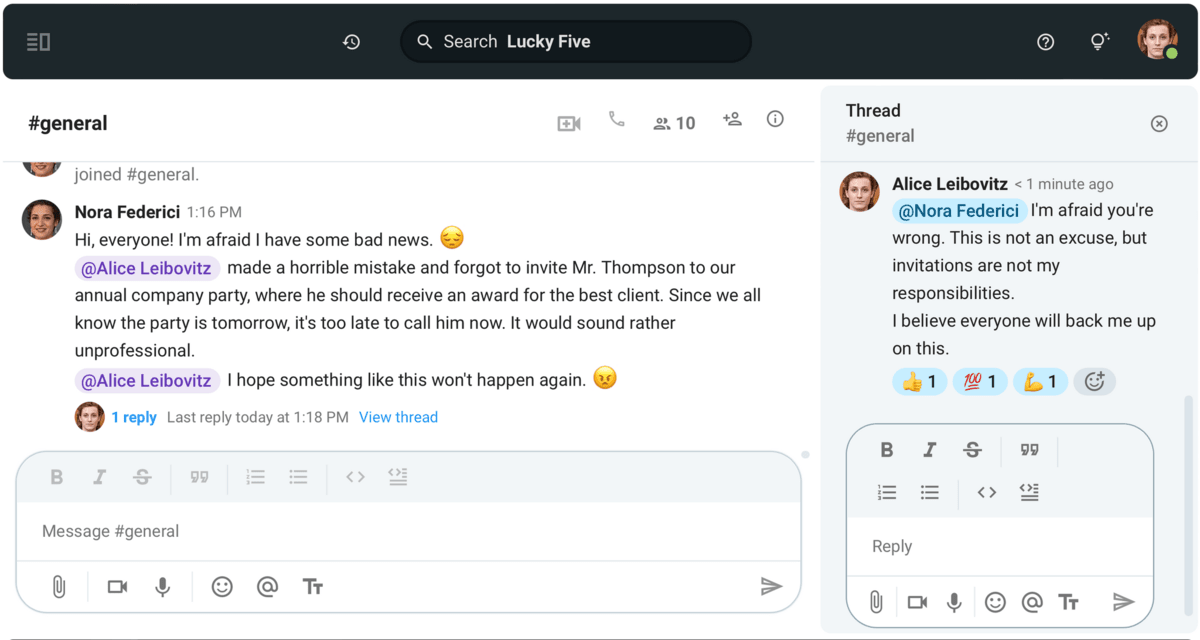As Merriam-Webster’s word of the year 2022, gaslighting gained traction, and its popularity doesn’t seem to dwindle.
Actually, the evidence of our society’s increasing awareness and absorption in this topic is the fact that “gaslighting” saw an amazing 1,740% increase in lookups in 2022 compared with 2021.
Keeping that in mind, let’s explore the following:
- The definition of gaslighting (at work),
- The most common signs you’re being gaslighted, and
- Ways to shut down gaslighting.
Let’s dive into it!
What is gaslighting?
Gaslighting is a type of psychological manipulation in which a gaslighter is trying to make you question your perception of events. When someone is gaslighting you, you feel like you’re going crazy.
Gaslighting can happen anywhere — in your private, as well as in your professional life. Consequently, your gaslighter can be your romantic partner, a friend, a family member, a boss, or anyone in a position of power.
Let’s see what gaslighting at work means and looks like.
What is gaslighting at work?
In the workplace, the gaslighter can be a coworker or a manager. Usually, it’s the person that abuses their power in an attempt to control someone or a situation, such as:
- A toxic manager,
- A scheming colleague,
- A discriminatory workgroup,
- A dissatisfied client, or
- A business rival.
Even though the method and the result of gaslighting at work and in our private lives are the same, the consequences differ.
Namely, in our private lives, only our relationship with a person gaslighting us is at risk.
On the other hand, in the workplace, aside from the person being gaslighted, the organization and the business itself also bear the consequences.
Examples of gaslighting at work
Just to be sure you know exactly what gaslighting at work looks like, here are some examples.
Example #1: Lying about what happened
Let’s look at the Pumble example below, where Nora is faced with her boss Katie gaslighting her.
After having given Katie a project proposal on Monday, Nora is looking forward to her feedback.
However, Katie is gaslighting Nora by denying getting anything from her. This makes Nora question her own reality.

Example #2: Accusing you of mistakes you didn’t make
Gaslighting also occurs when someone accuses you of something you didn’t do.
Below, Nora is accusing Alice that she forgot to invite a business partner of theirs to their company party.
Fortunately, Alice advocates for herself and tells the rest of the team the truth.

How do I know if I’m being gaslighted?
One thing is certain: it’s not easy to realize whether you’re being gaslighted or not.
Here are the most common signs that point to it.
Sign #1: You hear constant negative accounts of your work performance
Although constructive feedback is always welcome, constant negative performance reviews from your boss may be a sign your boss is gaslighting you.
Still, negative feedback can be objective, so, just in case, you may ask your colleagues for a second opinion.
Sign #2: You begin to doubt your own abilities or opinions
Our contributor, Angela Ficken, a Licensed Independent Clinical Social Worker, pointed out that you might be gaslighted if you start doubting your capabilities and opinions:

“Signs [of gaslighting] may include:
- Being consistently made to doubt your own abilities or opinions,
- Having your accomplishments minimized or dismissed,
- Being blamed for problems that are not your fault,
- Feeling like you are constantly on edge, or
- Walking on eggshells around a particular person or group.”
Sign #3: You find yourself continually doubting your perception of reality
The most unsettling sign you’re being gaslighted is when you notice that you’re constantly doubting your perception of reality.
We spoke to another contributor of ours, Dr. Robin Stern, a Licensed Psychoanalyst, the Co-founder and Associate Director of the Yale Center for Emotional Intelligence, and the Author of The Gaslight Effect: How to Spot and Survive the Hidden Manipulation Others Use to Control Your Life. She told us about the red flags that might suggest you’re being gaslighted:

“You’re constantly second-guessing yourself. You’re asking yourself a dozen times a day: ‘Am I too sensitive?’ or ‘Am I too critical?’ or ‘Am I too paranoid?’ You often feel confused and crazy in interactions with your boss or your colleague. You feel like you don’t know what’s going on.”
Sign #4: Your gaslighter belittles your efforts, emotions, or perceptions
Another sign of gaslighting is when you constantly feel like your employer is belittling your efforts at work.
Moreover, if your colleague is minimizing your emotions and accusing you of overreacting, this can also be a sign you’re being gaslighted and that your colleague is actually your gaslighter.
Sign #5: You’re being excluded from professional activities relevant to or required for your job
If your colleagues are having regular meetings without you and you feel left out, consider who is excluding you from the meetings. That person might be your gaslighter.
However, be careful to consider all the information before you start pointing fingers. Maybe your attendance is not needed, and your colleagues are saving your time by not inviting you to those meetings.
How do you shut down gaslighting?
Finally, we bring you 7 tips that will help you deal with gaslighting.
Tip #1: Confirm that it actually is gaslighting
As gaslighting is a phenomenon that’s not easy to recognize, you should always confirm that what you’re dealing with is gaslighting, and not a rude coworker.
A Licensed Social Worker and the Clinical Director at Absolute Awakenings, Candace Kotkin-De Carvalho, underscores the importance of recognizing the signs of gaslighting as well:

“Knowing and recognizing the signs of gaslighting is a great first step in identifying and responding to this type of manipulative behavior. When you are able to recognize it, you can take action to protect yourself from further harm.”
Tip #2: Write everything down to sort out truth from distortion
To “turn off the gas on your gaslighter”, Dr. Stern suggests writing everything down.

“Take somebody with you to the meeting if you can. Make sure you record every conversation by saying to your gaslighter upfront: ‘After the meeting, I’m gonna send you an email just confirming what we talked about.’
Make sure that you are writing everything down and that it is in alignment with workplace protocols.”
Tip #3: Ask your colleagues for a second opinion
Dr. Robin Stern also suggests checking with our colleagues when we’re unsure of what’s going on.

“Check it out with your friends: ‘I see it this way. I’m a little unsure. I’m trying to sort things out for myself. What do you think?’”
This can be an efficient way to regain trust in yourself.
Tip #4: Get out of the conversation that is a power struggle
Dr. Stern also recommends trying to recognize whether the conversation is a power struggle. This happens when 2 or more people compete for gaining control and influence.
If you realize this is going on, it’s better to opt out of the conversation.
Tip #5: Distance yourself from the gaslighter
Another expert we’ve contacted, Simo Jokic, Talent Acquisition Specialist at CAKE.com, advises us to distance ourselves from our gaslighter if we find them too emotionally exhausting.

“However, if the circumstances in the work environment are such that we are not in a situation to immediately leave this relationship, there are several things that can serve us.
We can try to reduce the relationship with that person to a minimum and distance ourselves emotionally, so that the communication is strictly business and concise, to narrow their room for maneuver to get closer to us and influence us.”
To save yourself from this toxic interaction, it helps to set healthy boundaries and say “No” to your gaslighter.
Tip #6: Go to the HR department
If you find dealing with your gaslighter yourself overwhelming, feel free to reach out to your HR department.
Moreover, talk to your coworkers and find out if anyone else has similar problems with the same person. If so, you can seek help from the HR department together.
Tip #7: Consider speaking to a mental health professional
Sometimes the situation with gaslighting is so dire that it might affect your mental health.
In that case, Candace Kotkin-De Carvalho strongly suggests you seek professional help.

“Navigating a toxic work environment can take a toll on mental health, so seeking professional help to process your emotions and provide additional coping strategies is an important step in protecting yourself. Through therapy, you can learn the tools that help to build your self-esteem and empower yourself in dealing with gaslighting.”
—
Further reading
This is just a summary of an article previously published on the Pumble blog.
To learn more about gaslighting in the workplace, we recommend reading the full article:

